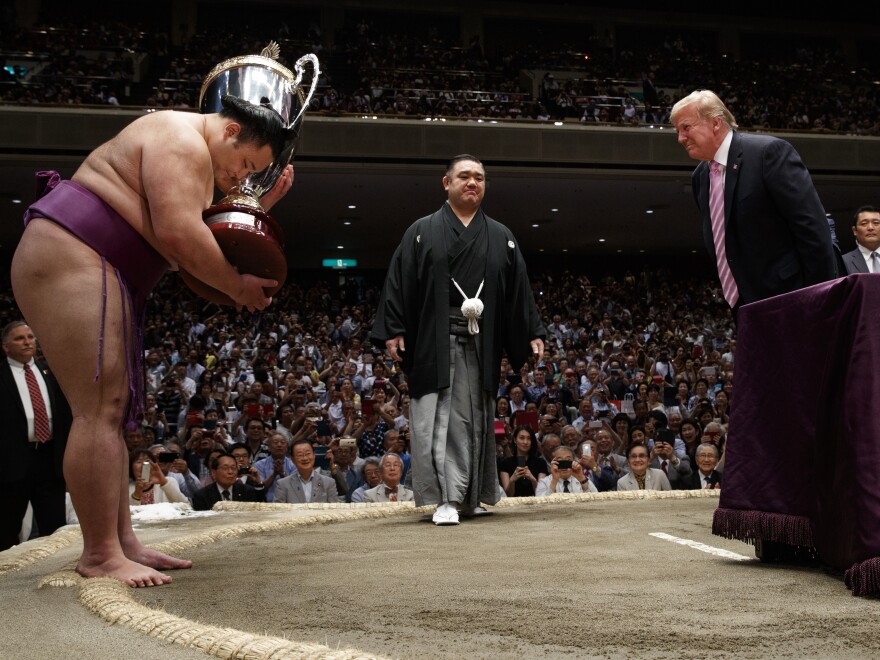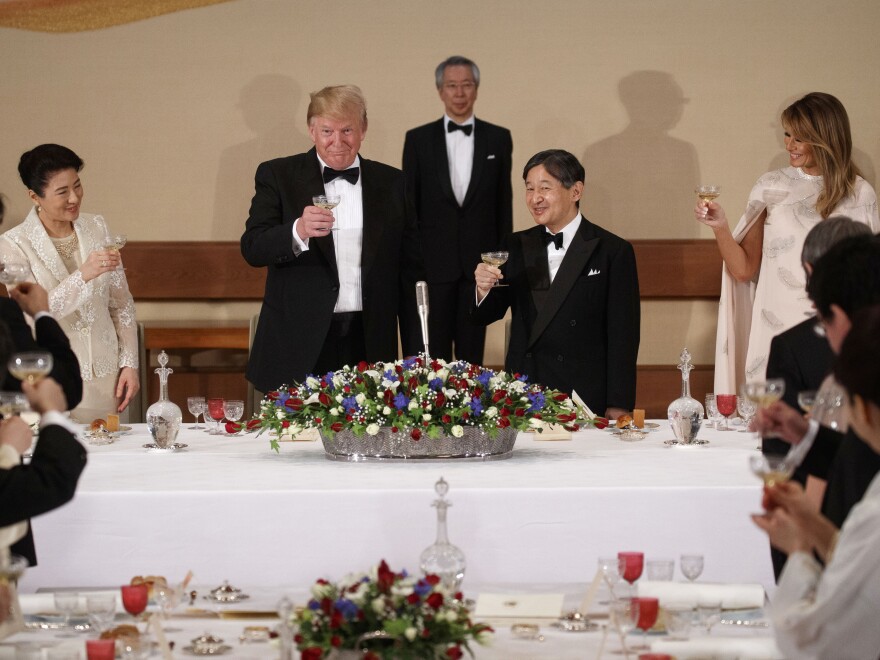The optics and the rhetoric of President Trump's state visit to Japan aimed to show two allies at their closest in history, at the start of a new Japanese emperor's reign. Trump is the first state guest to visit since Emperor Naruhito ascended the Chrysanthemum Throne on May 1. On Sunday, he and Japanese Prime Minister Shinzo Abe shared a round of golf, attended a sumo wrestling match and had a barbecue dinner.
But on Monday, a joint press conference with the two leaders revealed the two countries struggling to manage differences over a raft of policy issues — in particular, bilateral trade, North Korea and Iran.

One of Japan's top concerns is that the U.S. is threatening tariffs on Japanese car exports to the U.S. if a deal is not reached in six months. Those exports are a mainstay of the Japanese economy, and Tokyo is unnerved to hear that its chief ally classifies Japan's trade surplus as a security threat.
"When I talk about a security threat, I talk about a balance sheet," Trump said at Monday's press conference at the Akasaka Palace in Tokyo.
In its defense, Japan points out that it produces more cars in the U.S. than it exports there, and that investment has surged under the Trump administration, creating tens of thousands of U.S. jobs.
President Trump acknowledged that Japan has lowered its trade surplus, with plans to purchase more than 100 U.S. F-35 warplanes, more than any other ally.
Trump is expected to highlight that purchase on Tuesday, when he plans to visit the port of Yokosuka, home to both U.S. and Japanese warships. Japan's legislature has approved plans to convert helicopter carriers to accommodate F-35s, giving it its first aircraft carriers since World War II.

Trump suggested that any trade deal would have to wait until after Japan's parliamentary elections in July. Washington has its hands full with an ongoing trade war with China, and Abe could lose votes if he makes big concessions to the U.S. before the poll.
Analysts say Abe seeks to cement a two-thirds majority in Japan's parliament to achieve his long-held goal of rewriting Japan's U.S.-drafted postwar constitution, which limits the role of Japan's emperor and its military.
"I think he thinks of this as unfinished family business," says Jeff Kingston, director of Asian studies at Temple University's Japan campus in Tokyo. "This is something that his grandfather Kishi Nobusuke had wanted to do. So I think that he feels that this would bring completion to his political career."
Nobusuke served as Japan's prime minister from 1957 to 1960.

Washington is still eager to strike a trade deal, though, because Japan has signed trade agreements with big agricultural producers, including Australia and Canada, allowing their farmers and ranchers to grab market share from their U.S. competitors. The Trump administration has criticized Japan's move as unfriendly.
"What you're looking at is a U.S. government that is demanding what it could have had, and is unfortunately not in a position to acknowledge that," says Brad Glosserman, deputy director of the Center for Rule-making Strategies at Tama University in Tokyo.
Previously, the U.S. had proposed and then negotiated a trade deal known as the Trans-Pacific Partnership, Glosserman points out, but Trump walked out on it.
"I'm not bound by anything that anybody else signs, with respect to the United States," Trump said at Monday's press briefing. The TPP, he said, "would have destroyed our automobile industry and many of our manufacturers."
Trump reiterated his indifference to North Korea's short-range missile tests this month, despite criticism of the launches from his own national security adviser, John Bolton. The tests also worry South Korea and Japan, both of which are within the missiles' striking range. So are some U.S. military bases in these countries.
But Trump pointed to the lack of nuclear and long-range missile tests as signs of his diplomatic success with North Korea. "I am very happy with the way it's going, and intelligent people agree with me," he said.
Abe is the only regional leader who has not met with North Korean leader Kim Jong Un, and therefore has less to offer the U.S. as a mediator.
This is not the case with Iran, with which Japan has long had friendly ties. Japan has also been highly reliant on Iranian oil, but has had to cut that reliance due to U.S. sanctions. Prime Minister Abe is considering traveling to Iran next month, and at Monday's briefing, he pledged to do whatever he could to mediate.
Japanese media have reported that Tehran would like Tokyo to mediate with the U.S. on its behalf.
Japan has supported the 2015 Iran nuclear deal, which President Trump pulled the U.S. out of.
"This is one of the few issues on which Japan very clearly takes a position that is contrary to the U.S. government. And usually, Abe's pretty good about positioning himself to be the faithful ally" of the U.S., says Daniel Sneider, a Japan expert at Stanford University.
All the policy talk on the second full day of Trump's visit stood in sharp contrast to the first day, which was centered around golf, sumo wrestling, burgers and steak. The schedule was clearly calculated to please Trump and highlight the closeness of the two leaders.
Trump and Abe "are good friends, it seems, but that is not the issue," says Kunihiko Miyake, a former diplomat and now research director at the Canon Institute for Global Studies in Tokyo.
"This is not just for Mr. Trump," he says, "this is for the president of the United States." And once the ceremonies are finished, the U.S. and Japanese leaders must cooperate on facing urgent strategic challenges, including the rise of Iran and China.
Copyright 2021 NPR. To see more, visit https://www.npr.org. 9(MDAxNzg0MDExMDEyMTYyMjc1MDE3NGVmMw004))









